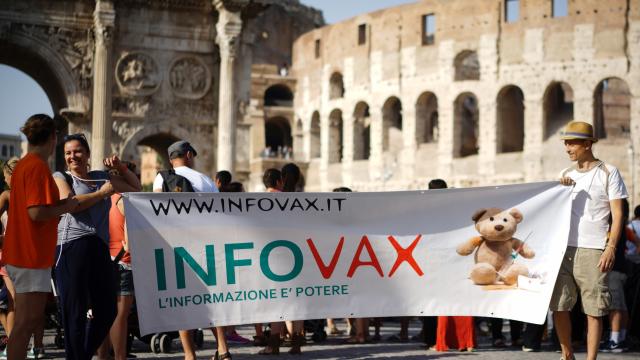Italian schools have begun turning away children who have not received mandatory vaccinations after a temporary waiver expired, the New York Times reported on Tuesday, with at least 300 children told they could not attend kindergarten in the city of Bologna this week.
A 2017 law mandated children enrolled in Italian schools receive 10 different vaccines,the Times wrote, in “response to a worrisome decline in vaccinations nationwide and a measles outbreak that same year.” However, last year the Health Ministry — headed by a member of the Five Star Movement political party, whose co-founder the paper noted has brought up conspiracy theories linking vaccination to autism — issued a temporary rule allowing parents to simply state the children had been vaccinated rather than receiving a note from a doctor. The waiver was heavily criticised by the scientific and medical community, which said it could reverse progress made in boosting Italy’s vaccination rates in recent years.
“Italy’s measles vaccine coverage was par with Namibia, lower than Ghana,” San Raffaele University in Milan microbiology and virology professor Roberto Burioni told CNN last year. “But the law was working, the coverage was improving. We should strengthen it, not weaken it.”
However, that waiver expired on March 10, the Times wrote, meaning that provisions of the law prohibiting nursery school attendance by unvaccinated children and imposing fines on parents who refuse to vaccinate older children are now back in effect:
Children cannot attend nursery schools unless they are vaccinated, and parents of elementary and middle school pupils risk fines of up to 500 euros if they don’t have doctor’s notes showing that their children were vaccinated against the required diseases.
In Bologna, officials said the 300 children did not present the official document attesting to their vaccination on Monday, and so could not attend public nursery schools.
“Now everyone has had time to catch up,” Health Minister Giulia Grillo told Italian newspaper La Repubblica, the BBC reported. “… No vaccine, no school.”
According to the BBC, the 10 vaccines include those that immunize against chickenpox, polio, measles, mumps, and rubella. Officials in Bologna said that some 5,000 children in the city do not have proper documentation saying they have been vaccinated. The BBC added that Italian media reported regional authorities are “handling the situation in a number of different ways,” with no notices of suspension reported in some areas and grace periods allowed in others.
The BBC wrote that the law was passed to bolster flagging Italian vaccination rates, which is in part due to a growing movement of anti-vaccination activists (widely known as antiaxxers). Those people believe that vaccines are dangerous and, depending on what misinformation they have absorbed, can cause everything from autism and attention deficit disorder to “vaccine overload,” a made-up condition that is not an actual medical term.
Such conspiracy theories have repeatedly been discredited by researchers and have no scientific backing, though the numbers of people who believe in them have become significant enough that the World Health Organisation (WHO) deemed the movement one of the top 10 global public health threats of 2019.
“Italy is part of a global trend of distrust in mediators—doctors and scientists—who can interpret and explain data,” La Sapienza University of Rome history of medicine and bioethics teacher Andrea Grignolio told CNN in 2018. “With the advent of the Internet, people have the illusion they can access and read data by themselves, removing the need for technical and scientific knowledge.”
According to the Times, the current Italian government is working on a confusing plan to introduce “flexible obligation,” in which immunization would only be mandatory if rates dipped below herd immunity levels. That’s the point at which so many people have been vaccinated against a given disease that those that have forgone their shots will still be unlikely to catch it, but it’s difficult to see what purpose a “flexible” system serves beyond preserving opt-outs for antivaxxers.
While immunization rates hovered around 80 per cent in 2017, when the law was passed, the Times added, the country now is nearing (and in some areas has already met) the WHO target of 95 per cent.
